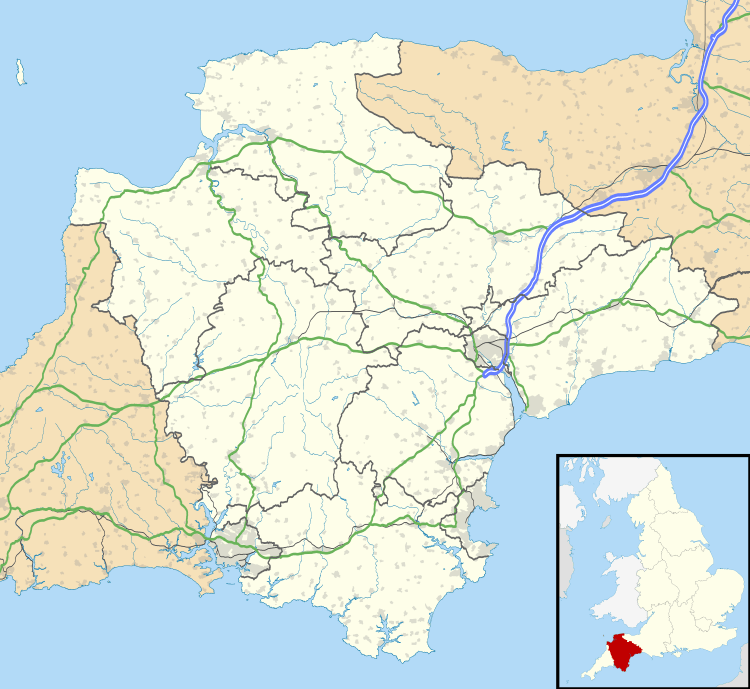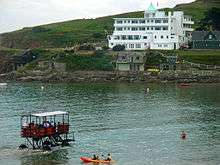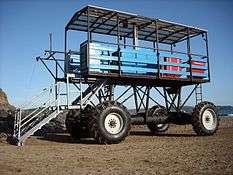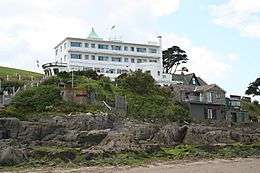Burgh Island Hotel
| Burgh Island Hotel | |
|---|---|
|
The Burgh Island Hotel in 2009 | |
 | |
| General information | |
| Location | Burgh Island, Devon |
| Coordinates | 50°16′47.06″N 3°53′52.94″W / 50.2797389°N 3.8980389°WCoordinates: 50°16′47.06″N 3°53′52.94″W / 50.2797389°N 3.8980389°W |
| Opening | 1929 |
| Design and construction | |
| Architect | Matthew Dawson |
| Developer | Archibald Nettlefold |
| Other information | |
| Number of rooms | 25 |
| Website | |
| Official website | |
The Burgh Island Hotel is a hotel on Burgh Island, Devon in England.
History
In the 1890s, the music hall star George H. Chirgwin built a prefabricated wooden house on the island, which was used by guests for weekend parties. The island was sold in 1927 to the filmmaker Archibald Nettlefold of Nettlefold Studios, the heir to the Guest, Keen and Nettlefolds engineering firm, who built a more substantial hotel in the Art Deco style, which became a popular destination in the 1930s.[1] Additions were made through the 1930s, including a room created from the captain's cabin of the warship HMS Ganges (1821). The hotel is now a Grade II Listed Building[2]
During World War II, the hotel was used as a recovery centre for wounded RAF personnel. The top two floors of the hotel were damaged by a bomb during the conflict. Despite being repaired, it suffered a period of post war decline after being converted to self-catering apartment accommodation. The hotel was restored during the early nineties by Tony and Beatrice Porter.[3]
Notable visitors

Burgh Island Hotel is linked to the crime novelist Agatha Christie, as it inspired the settings for both And Then There Were None and the Hercule Poirot mystery Evil Under the Sun. The Beatles used the hotel when they were playing a concert in Plymouth.[4] Noël Coward visited the hotel, intending to stay three days and ended up staying three weeks.[5] Other guests who have reputedly used the hotel include Edward and Mrs. Simpson[2][6] and it is said that Eisenhower and Churchill met there in the weeks leading up to the D-Day invasion.[6]
Transport

The island is approximately 250 metres (270 yards) from the mainland at Bigbury-on-Sea and is approachable on foot at low tide. At high tide, the Sea Tractor, which is operated by the hotel, transports passengers back and forth. At the end of World War 2 a "duck" (sea-land vehicle) was used until the sea tractor came in 1955. There is a tract of hard sand which is the better way. The current, third generation tractor dates from 1969. The vehicle drives across the beach with its wheels underwater on the sandy bottom while its driver and passengers sit on a platform high above. Power from a Fordson tractor engine is relayed to the wheels via hydraulic motors. In 2011, it cost £2 per person.
Media
The 2001 TV adaptation of Evil Under The Sun used the island as a filming location. Several scenes from the BBC’s 1987 dramatisation of Christie’s story Nemesis were filmed in the hotel. In 1994 'Somewhere Over the Rainbow', an episode of the television series Lovejoy, was set and filmed on the island. The island was the location for GMTV's Inch-loss Island slimming feature in 2008, as it was for the original series in 2001. The climactic scene of the 1965 British film Catch Us If You Can (featuring The Dave Clark Five) takes place at the island.[7]
References
- Citations
- ↑ Porter, Tony: The Great White Palace, Doubleday 2002
- 1 2 http://www.heritagegateway.org.uk/Gateway/Results_Single.aspx?uid=99608&resourceID=5 www.heritagegateway.org.uk accessed 8 Sept 2009
- ↑ Porter, Tony. The Great White Palace, Doubleday 2002
- ↑ http://www.dailymail.co.uk/travel/holidaytypeshub/article-587134/Hidden-treasure-South-Coast.html Daily Mail 14 September 2007, accessed 8 Sept 2009
- ↑ http://www.dailymail.co.uk/travel/holidaytypeshub/article-587692/All-hands-deco--Burgh-Island-Hotel.html Daily Mail 31 January 2002, accessed 8 Sept 2009
- 1 2 Porter 2002
- ↑ http://www.screenonline.org.uk/film/id/569284/index.html British Film Institute Online, accessed 9 Sept 2009
External links
- Burgh island hotel: plenty to know, Harriet Partridge, Architects Journal, 22 November 2013
- English Ferry Wades Through Ocean Waves the original Burgh Island sea tractor, from Science and Mechanics, 1935
